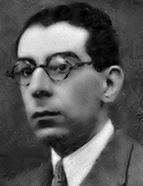

Throughout his career , he published several historiographical works, including Erratas à História de Portugal [Corrigenda to the History of Portugal] (1939, with João Ameal), Infante D. Henrique [Prince D. Henrique] (1948), D. Carlos I e o Brasil [D. Carlos I and Brazil] (1957), Homens e Ideias [Men and Ideas] (1960), Política e História [Politics and History] (1960) and João Franco e os intelectuais do seu tempo [João Franco and the Scholars of his time] (1963). He was a member of the Academia Portuguesa de História [ Portuguese Academy of History ] and wrote for its Boletim. He also collaborated with various publications , including O Debate, Boletim da Mocidade Portuguesa, Ler, Nação Portuguesa, Ordem Nova, and Sulco.
The formative influence of António Sardinha and Integralism o Lusitano permeate d his work. He corresponded frequently with Sardinha at the beginning of the 1920s, informing him of current affairs in Lisbon and exchanging various political and historiographical impressions. The connection to Sardinha was quite impressive and can be seen, for example, in the tribute Cavalheiro paid to him in January 1958, on Emissora Nacional, the national radio broadcaster, on the anniversary of his death, or in the way he continued to refer to him as a “ friend and teacher ” ( Note from 09.01.1958 to Ana Júlia Sardinha, A. Sardinha Estate ).
Rodrigues Cavalheiro ’ s undergraduate thesis at the Faculdade de Letras [ School of Arts and Humanities ] ( Gomes Freire, mau português e mau soldado [Gomes Freire, a bad Portuguese and a bad soldier] , 1928) reproduces long passages from an article he had published in 1922 in the magazine Nação Portuguesa under the title “ À margem dum processo (A questão de Gomes Freire) ” [ On the margin of a lawsuit (The issue of Gomes Freire) ] , along the revisionist lines with which Integralism o sought to counter liberal historiography at the time. In it, Cavalheiro explicitly stated that he wanted to look at the “ liberal heroes ” from a new perspective – in this case, linking the G eneral to foreign interests and denouncing what he considered to be the construction of a fictitious hero in liberal historiography ( Nação Portuguesa , II series , n o. 5, 1922, pp. 222-226).
This work is financed by national funds through FCT - Foundation for Science and Technology, I.P, in the scope of the projects UIDB/04311/2020 and UIDP/04311/2020.
